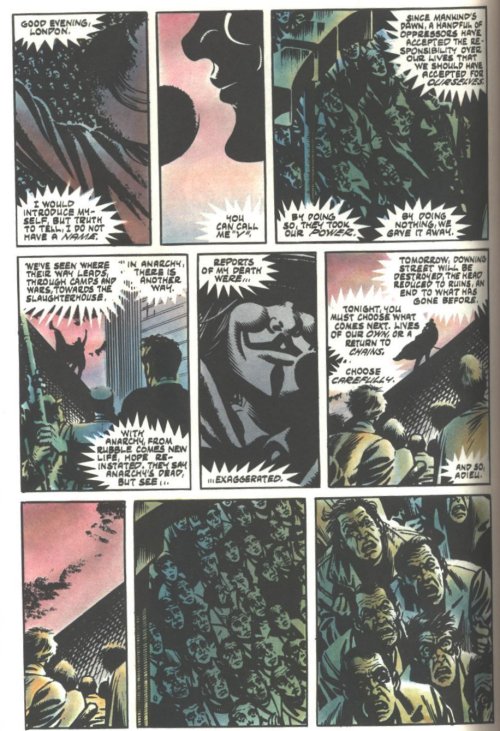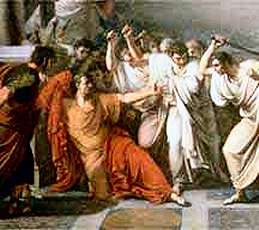In honor of the event, the Ministry of Culture of this secessionist republic of one would like to offer a commemorative reading. This is from Act IV, Scene III of Friedrich von Schiller’s play Wilhelm Tell (1805). According to the legends from which Schiller drew his story, in 1307 William Tell, a renowned archer and patriot from the canton of Uri, assassinated Gessler, the brutal governor who ruled the canton on behalf of the Holy Roman Emperor in Austria. The assassination sparked an uprising in which the people of Uri and the surrounding cantons tore down the Hapsburg forts, and drove the Austrian forces out of what then became the free and independent Swiss Confederacy. How far the legends reflect historical events and how far they are inventions of early modern Swiss nationalists is a matter of debate; but if true, they record one of the most successful tyrannicides known to history.
(GESSLER and RUDOLF DER HARRAS on horseback.)
GESSLER: Say, what you will, I am the Emp’ror’s servant And must give thought, to how I best can please him. He hath not sent me to this land, to flatter The people and be soft to them — He wants Obedience, the issue is, shall farmers Be master in the land or shall the Emp’ror.
ARMGARD: Now is the moment! Now I’ll bring it up!
(Approaches timidly.)
GESSLER: I have not had the hat put up as jest In Altorf, nor was it to test the hearts O’ th’ people, these I’ve known for quite some time. I have had it put up, that they might learn To bend their necks to me, which they hold high — I had the inconvenient thing set up Upon their path, where they would have to pass, That they would meet it with their eyes, and it Would bring to mind their lord, whom they forget.
RUDOLF DER HARRAS: And yet the people do have certain rights —
GESSLER: To ponder these, there is just now no time! — Far reaching projects are at work and growing, The Imperial house would grow, and what the father Hath gloriously begun, the son will end. This little people is to us a stone I’ th’ way — this way or that, they must submit.
(They want to pass on. The woman throws herself down before the GOVERNOR.)
ARMGARD: Kind-heartedness, Lord Governor! Mercy! Mercy!
GESSLER: Why stand you on the public highway in My way — Stand back!
ARMGARD: My husband lies in prison, The wretched orphans cry for bread — Have pity, Severest Lord, on our great misery.
RUDOLF DER HARRAS: Who are you? And who is your man?
ARMGARD: A poor Wild hay man, gracious Lord, from Rigiberg, Who over the abyss mows down the grass Which freely grows from jagged rocky walls, To which the cattle do not dare to climb —
RUDOLF DER HARRAS (to the GOVERNOR): By God, a miserable and wretched life! I beg you, set him free, the wretched man, However heavy his offense may be, His ghastly trade is punishment enough.
(To the woman.)
You shall have justice — Yonder in the castle Bring your petition — Here is not the place.
ARMGARD: No, no I will not budge from out this place, Until the Gov’rnor hath returned my husband! Six months already lies he in the tower And waits the sentence of the judge in vain.
GESSLER: Woman, would you use force with me, away.
ARMGARD: I ask for justice, Gov’rner! Thou art judge I’ th’ country in the Emp’ror’s stead and God’s. Perform thy duty! As thou hop’st for justice Yourself from Heaven, so show it to us.
GESSLER: Hence, drive this brazen people from mine eyes.
ARMGARD (Seizes the reins of his horse.): No, no, there’s nothing more for me to lose. — Thou com’st not, Gov’rnor from this place, ’til thou Hast rendered justice to me — Knit thy brows, And roll thine eyes, just as thou wilt — We are In such unbounded misery, that we Care not about thine anger —
GESSLER: Woman, hence, Or else my horse will trample over thee.
ARMGARD: So let it trample over me — there —
*(She pulls her children to the ground and throws herself with them in his way.) *
Here I lie With all my children — Let the wretched orphans Be trodden under by thy horses’ hooves, It will not be the worst, that thou hast done
RUDOLF DER HARRAS: Woman, are you mad?
ARMGARD (vehemently continuing): Thou hast for some time Trampled the Emperor’s land beneath thy feet! — O I am but a woman! Were I man, I would know something better, than to lie Here in the dust —
(He hears the previous music again upon the crest of the way, but muffled.)
GESSLER: Where are my servants? Have them carry her away from here, or I’ll Forget myself and do what I will rue.
RUDOLF DER HARRAS: The servants can not pass therethrough, O Lord, The hollow way is blocked up by a marriage.
GESSLER: An all too gentle ruler am I to This people still — their tongues are still. too free, They have not yet been tamed, as they should be — Yet this shall all be changed, I promise it, I will yet break this stubborn mood of theirs, The brazen spirit of freedom I will bend. Throughout these canton lands I’ll promulgate A new decree — I will —
(An arrow pierces through him, he puts his hand on his heart and starts to fall. With feeble voice.)
God grant me mercy!
RUDOLF DER HARRAS: Lord God what is this? Whither came it?
ARMGARD (starting up): Murder! Murder! He totters, sinks! He’s hit!
The arrow’s hit the center of his heart!
RUDOLF DER HARRAS (springs from his horse): What horrible occurrence — God — Lord knight — Call on the mercy of your God — For you Are now a man of death —
GESSLER: That is Tell’s shot
(Is slid down from his horse into the arms of RUDOLF DER HARRAS and is laid upon the bench.)
TELL (appears above on the top of the rocks): Thou ken’st the archer, seek not for another! Free are our huts, the innocent are safe ‘Fore thee, thou wilt no longer harm the land.
(Disappears from the heights.)
(People rush in.)
STUSSI (in front): What is the matter? What hath happened here?
ARMGARD: The Gov’rnor hath been shot through by an arrow.
PEOPLE (rushing in): Who hath been shot?
(Meanwhile the foremost of the wedding train come on the stage, the hindmost are still on the heights, and the music continues.)
RUDOLF DER HARRAS: He’s bleeding fast to death. Go forth, get help! Pursue the murderer! — Unhappy man, so must it end with thee, And yet thou would’st not listen to my warning!
STUSSI: By God! here lies he pale and without life!
MANY VOICES: Who’s done the deed?
RUDOLF DER HARRAS: Hath madness seized these people, That they make music for a murder? Silence.
(Music suddenly breaks off, still more people come in.)
Lord Gov’rnor, speak now, if you can — Have you No more to trust to me?
(Gessler gives a sign with his hand, which he repeats with vehemence, when it is not understood at once.)
Where shall I go? — To Kussnacht? — I can’t understand you — O Be not impatient — Leave all thought of earth, Think now, to reconcile yourself with Heaven.
(The whole marriage party stands around the dying man with an unfeeling horror.)
STUSSI: Behold, how pale he grows — Now enters death Into his heart — his eyes have now grown dim.
ARMGARD (lifts up a child): See, children, how a maniac expires!
RUDOLF DER HARRAS: O insane women, have you then no feeling, That you must feast your eyes upon his horror? — Help — Lend your hand — Will no one stand by me, To draw the painful arrow from his breast?
WOMEN (step back): We touch the man, whom God himself hath struck!
RUDOLF DER HARRAS: Curse on you and damnation!
(Draws his sword.)
STUSSI (seizes him by the arm): Dare it, Lord! Your rule is at an end. The tyrant of The country is now fallen. We’ll endure No further violence. We are free men.
ALL (tumultuously): The land is free.
RUDOLF DER HARRAS: And is it come to this? Fear and obedience so quickly end? (To the men in arms, who are thronging in.) You see the horrifying act of murder, The which hath happened here help is in vain — ‘Tis useless, to pursue the murderer. We’re pressed by other worries — On, to Kussnacht, That we may save the Emp’ror’s fortresses! For in this moment are dissolved alike All bonds of order and all ties of duty, And no man’s loyalty is to be trusted.
(Whilst he exits with the men in arms, six BROTHERS OF MERCY appear.)
ARMGARD: Make room! Make room! Here come the Brothers o’ Mercy.
STUSSI: The victim lies — The ravens now descend.
BROTHERS OF MERCY (form a half-circle around the dead man and sing in deep tones): With hasty step death comes to man, It hath no respite to him given, It strikes him midway in his span, Forth from life’s fullness is he driven, If he’s prepared or not, to die, He must stand ‘fore his Judge on high!
(Whilst the last lines are repeated, the curtain falls.)
— Friedrich von Schiller (1805): Wilhelm Tell, translated by William F. Wertz, Jr.
Thus always to tyrants. Beware the State; celebrate the Ides of March!


 There are lots of reasons to avoid tyrannicide as a political tactic — after all, these two famous cases each ended a tyrant but not the tyrannical regime; Alexander II was replaced by the even more brutal
There are lots of reasons to avoid tyrannicide as a political tactic — after all, these two famous cases each ended a tyrant but not the tyrannical regime; Alexander II was replaced by the even more brutal